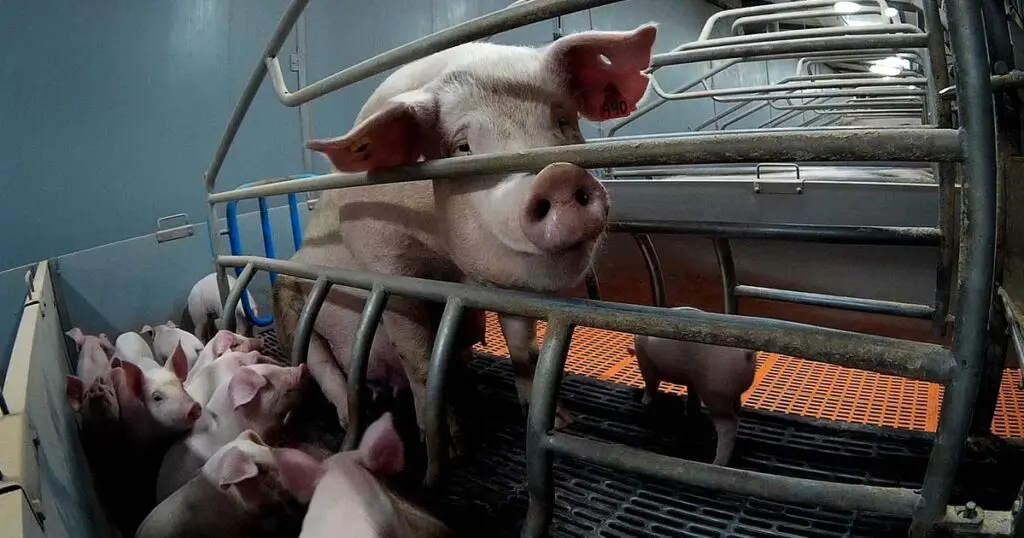
We’ve all heard about factory farming, but the reality of its inhumane practices can no longer be ignored. The exponential growth of this industry has raised serious concerns about the well-being of animals and the ethical implications of our food choices. It’s time to shed light on the ugly truth behind factory farming and explore why we can no longer turn a blind eye to its inhumane practices.

Understanding Factory Farming
Factory farming, also known as intensive farming or industrial agriculture, is a system that prioritizes profit and efficiency over animal welfare. In these facilities, animals are confined in small spaces, often in battery cages, gestation crates, or overcrowded barns.These confined spaces not only limit the animals’ movement but also prevent them from engaging in natural behaviors. Imagine a hen unable to spread her wings or a pregnant pig unable to turn around in her crate. The psychological and physical implications for these animals are severe and undeniable.
Understanding Factory Farming
Factory farming, also known as intensive farming or industrial agriculture, is a system that prioritizes profit and efficiency over animal welfare. In these facilities, animals are confined in small spaces, often in battery cages, gestation crates, or overcrowded barns.These confined spaces not only limit the animals’ movement but also prevent them from engaging in natural behaviors. Imagine a hen unable to spread her wings or a pregnant pig unable to turn around in her crate. The psychological and physical implications for these animals are severe and undeniable.
Unveiling the Inhumane Treatment
One of the most disturbing aspects of factory farming is the inhumane treatment of animals. The confinement and overcrowding they endure is unimaginable. Battery cages, stacked one upon another, confine egg-laying hens to spaces so small they can’t even stretch their wings.
Gestation crates, used for pregnant pigs, restrict their movement to a tiny area where they can barely move a step. This constant lack of space takes a tremendous toll on their physical and mental well-being. Moreover, overcrowded barns filled with animals result in increased stress levels and a higher risk of disease transmission.
But the cruelty doesn’t end there. Animals in factory farms often experience rough handling and are subjected to long journeys without proper care. These stressful conditions can worsen their health, leading to a decline in the overall quality of the animal products we consume.
Health Risks for Animals and Humans
Factory farming not only harms the animals but also poses significant health risks for both animals and humans. The cramped and unsanitary conditions in which animals are kept create a breeding ground for diseases. The close proximity of animals makes it easier for infections to spread rapidly.
To combat the spread of diseases in these crowded environments, animals are often given antibiotics. However, this overuse of antibiotics contributes to the rise of antibiotic-resistant bacteria, posing a serious threat to human health. We’re gradually losing our ability to treat common infections due to the misuse of these life-saving drugs.
Furthermore, factory farming is a major contributor to environmental degradation. The pollution produced by concentrated animal feeding operations contaminates our land, water, and air. This not only endangers wildlife and natural ecosystems but also poses risks to nearby communities.

Ethical Implications
Factory farming raises significant ethical concerns regarding animal rights and their needless suffering. Animals are often treated as mere commodities, devoid of value beyond their economic worth. They are reduced to objects, stripped of their inherent dignity and subjected to a life of pain and suffering.
Ethical Implications
Factory farming raises significant ethical concerns regarding animal rights and their needless suffering. Animals are often treated as mere commodities, devoid of value beyond their economic worth. They are reduced to objects, stripped of their inherent dignity and subjected to a life of pain and suffering.
Alternatives and Solutions
Thankfully, there are alternatives to factory farming that prioritize animal welfare and sustainability. Sustainable and ethical farming practices, such as organic farming and free-range systems, provide better living conditions for animals. These systems allow animals to roam freely, engage in natural behaviors, and lead dignified lives.
Alternatives and Solutions
Thankfully, there are alternatives to factory farming that prioritize animal welfare and sustainability. Sustainable and ethical farming practices, such as organic farming and free-range systems, provide better living conditions for animals. These systems allow animals to roam freely, engage in natural behaviors, and lead dignified lives.
Legislation also plays a crucial role in driving change. It’s important to support policies that improve animal welfare standards and hold factory farms accountable for their practices. By advocating for stronger regulations and supporting organizations that work towards animal welfare, we can contribute to a more compassionate and sustainable future.
Individual Actions Make a Difference
Change starts with us. By raising awareness about the realities of factory farming and sharing knowledge, we can inspire others to make informed choices. Engaging in conversations about the ethical, environmental, and health implications of factory farming can encourage others to reevaluate their food choices.
Choosing to boycott factory-farmed products and opting for alternatives that align with our values can have a significant impact. With every purchase, we vote for the future we want to see. Let’s choose compassion over cruelty and support a food system that respects the lives of animals.
Additionally, supporting organizations and initiatives that focus on animal welfare, sustainable farming, and ethical practices is a powerful way to foster change at a systemic level. Together, we can amplify our impact and create a world where animals are treated with the dignity they deserve.
Conclusion
The inhumane practices of factory farming should no longer be ignored. The suffering endured by animals and the ethical implications of our choices demand our attention and action. It’s time to confront the ugly truth behind factory farming and make a conscious effort to support better alternatives.
Remember, change begins with each one of us. By making informed decisions, raising awareness, and supporting organizations that promote animal welfare, we can build a future that embraces compassion and rejects the inexcusable cruelties of factory farming.
















































